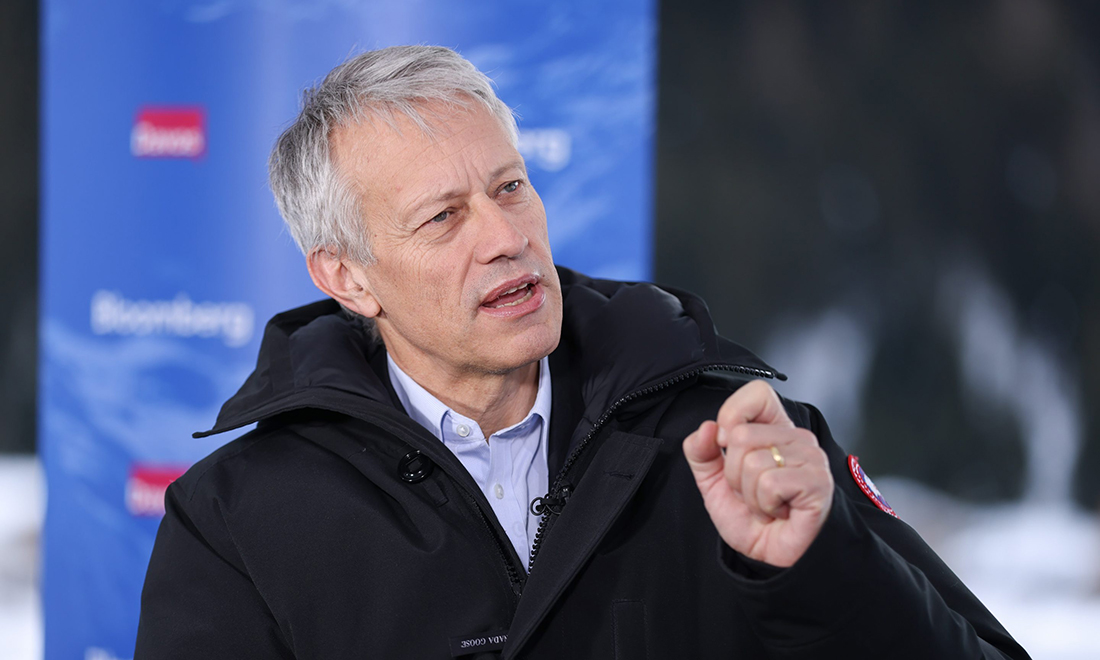
可口可樂公司(Coca-Cola)堅(jiān)持漲價(jià),沒有采取百事公司(PepsiCo)的策略,,避開了導(dǎo)致競(jìng)爭(zhēng)對(duì)手陷入困境的通脹問題,。相比之下,百事公司的做法導(dǎo)致其與法國(guó)超市巨頭家樂福(Carrefour)公開交惡,。
碳酸飲料生產(chǎn)商百事與家樂福發(fā)生沖突,,后者聲稱由于“縮水式通脹”將百事的產(chǎn)品下架??s水式通脹是指產(chǎn)品質(zhì)量或數(shù)量下降,,但價(jià)格不變。百事公司否認(rèn)了家樂福的指控,,稱其商品被下架的原因是合同談判,。
百事公司最大的競(jìng)爭(zhēng)對(duì)手、碳酸軟飲料行業(yè)的市場(chǎng)領(lǐng)導(dǎo)者可口可樂公司,,通過確立并堅(jiān)持長(zhǎng)期目標(biāo),,似乎已經(jīng)避開了類似的狀況。
可口可樂公司的首席執(zhí)行官詹鯤杰(James Quincey)表示,,公司努力避免與供應(yīng)商發(fā)生摩擦,,但在當(dāng)前的全球經(jīng)濟(jì)環(huán)境下,不斷變化的通脹率可能會(huì)產(chǎn)生問題,。
詹鯤杰在瑞士達(dá)沃斯告訴美國(guó)消費(fèi)者新聞與商業(yè)頻道(CNBC):“我們有與供應(yīng)商打交道的長(zhǎng)期策略,,我們著眼于建立長(zhǎng)期關(guān)系。鑒于我們的規(guī)模,我們希望保證長(zhǎng)期供應(yīng)安全,,我們的首要問題是獲得足夠的供應(yīng),,我們會(huì)達(dá)成長(zhǎng)期定價(jià)協(xié)議,然后再加上對(duì)沖,?!?/p>
“我們幾乎可以平穩(wěn)度過經(jīng)濟(jì)周期。我們不會(huì)很快漲價(jià),,也不會(huì)快速降價(jià),,我們喜歡著眼于整個(gè)周期,這能夠幫助我們穩(wěn)定業(yè)務(wù),,因此我們的定價(jià)不會(huì)大幅波動(dòng),,這是我們經(jīng)過深思熟慮采取的策略?!?/p>
據(jù)《金融時(shí)報(bào)》(Financial Times)報(bào)道,2023年第二季度,,可口可樂的價(jià)格同比上漲了10%,,但該公司公布的最新數(shù)據(jù)顯示,這對(duì)公司的利潤(rùn)幾乎沒有任何影響,。
事實(shí)上,,可口可樂公司在2023年10月發(fā)布的2023年第三季度的財(cái)報(bào)顯示,凈收入增長(zhǎng)了8%,,達(dá)到120億美元,,濃縮液銷量增長(zhǎng)了2%,詹鯤杰形容這是業(yè)績(jī)“穩(wěn)定”的一個(gè)季度,。
相比之下,,百事公司在2023年第二季度漲價(jià)15%,有機(jī)銷量卻下滑了2.5%,,但到第三季度,,公司的收入達(dá)到234.5億美元,超過了分析師預(yù)期的233.9億美元,。
詹鯤杰并不否認(rèn)一些地區(qū)出現(xiàn)了問題,。他說:“不同國(guó)家有不同的環(huán)境,公司與零售合作伙伴或多或少會(huì)有一些摩擦,,但歸根結(jié)底我們會(huì)堅(jiān)持我們的策略,,即贏得定價(jià)權(quán)?!?/p>
詹鯤杰補(bǔ)充道,,公司的策略是確保憑借公司的策略和專長(zhǎng)加快飲料業(yè)務(wù)的增長(zhǎng),而不是依靠單個(gè)供應(yīng)商單獨(dú)運(yùn)營(yíng)。他指出:“這對(duì)他們來說是有益的,?!?/p>
“縮水式通脹”之爭(zhēng)
囊中羞澀的消費(fèi)者和希望在生活成本危機(jī)中獲勝的政客們,令零售商感到壓力,。
法國(guó)超市巨頭家樂福表示,,計(jì)劃采取一些行動(dòng)應(yīng)對(duì)這個(gè)問題,今年早些時(shí)候,,家樂福聲稱將在法國(guó),、意大利、西班牙和比利時(shí)下架百事公司漲價(jià)的產(chǎn)品,,例如多力多滋(Doritos),、奇多(Cheetos)和七喜(7up)等。
家樂福最大的競(jìng)爭(zhēng)對(duì)手勒克萊爾超市集團(tuán)(E. Leclerc)的董事長(zhǎng)形容家樂福的做法是一次“力量的展現(xiàn)”,,但這并沒有吸引其他主要零售商跟進(jìn),。
雖然家樂福的做法在業(yè)內(nèi)被大加贊揚(yáng),百事公司卻聲稱家樂福對(duì)事件的描述并不真實(shí),。
1月9日,,百事公司的代表對(duì)《華爾街日?qǐng)?bào)》表示,當(dāng)家樂福聲稱已經(jīng)在部分門店禁售百事公司的產(chǎn)品時(shí),,該超市“錯(cuò)誤地描述了事件鏈,,真令人惋惜”。
發(fā)言人稱:“由于沒有就新合同達(dá)成一致,,我們?cè)谀甑淄V瓜蚣覙犯9┴?,他們知道可能出現(xiàn)這種情況。我們希望盡快就合同條款達(dá)成一致,,使我們的產(chǎn)品可以重新上架,,供消費(fèi)者享用?!?/p>
但家樂福卻對(duì)這種說法表示質(zhì)疑,,并告訴《華爾街日?qǐng)?bào)》:“家樂福集團(tuán)已經(jīng)做出了這個(gè)決定?!?/p>
任何一方目前均未回復(fù)《財(cái)富》雜志的置評(píng)請(qǐng)求,。(財(cái)富中文網(wǎng))
譯者:劉進(jìn)龍
審校:汪皓
可口可樂公司(Coca-Cola)堅(jiān)持漲價(jià),沒有采取百事公司(PepsiCo)的策略,,避開了導(dǎo)致競(jìng)爭(zhēng)對(duì)手陷入困境的通脹問題,。相比之下,百事公司的做法導(dǎo)致其與法國(guó)超市巨頭家樂福(Carrefour)公開交惡,。
碳酸飲料生產(chǎn)商百事與家樂福發(fā)生沖突,,后者聲稱由于“縮水式通脹”將百事的產(chǎn)品下架,。縮水式通脹是指產(chǎn)品質(zhì)量或數(shù)量下降,,但價(jià)格不變,。百事公司否認(rèn)了家樂福的指控,稱其商品被下架的原因是合同談判,。
百事公司最大的競(jìng)爭(zhēng)對(duì)手,、碳酸軟飲料行業(yè)的市場(chǎng)領(lǐng)導(dǎo)者可口可樂公司,通過確立并堅(jiān)持長(zhǎng)期目標(biāo),,似乎已經(jīng)避開了類似的狀況,。
可口可樂公司的首席執(zhí)行官詹鯤杰(James Quincey)表示,公司努力避免與供應(yīng)商發(fā)生摩擦,,但在當(dāng)前的全球經(jīng)濟(jì)環(huán)境下,,不斷變化的通脹率可能會(huì)產(chǎn)生問題。
詹鯤杰在瑞士達(dá)沃斯告訴美國(guó)消費(fèi)者新聞與商業(yè)頻道(CNBC):“我們有與供應(yīng)商打交道的長(zhǎng)期策略,,我們著眼于建立長(zhǎng)期關(guān)系,。鑒于我們的規(guī)模,我們希望保證長(zhǎng)期供應(yīng)安全,,我們的首要問題是獲得足夠的供應(yīng),,我們會(huì)達(dá)成長(zhǎng)期定價(jià)協(xié)議,然后再加上對(duì)沖,。”
“我們幾乎可以平穩(wěn)度過經(jīng)濟(jì)周期,。我們不會(huì)很快漲價(jià),,也不會(huì)快速降價(jià),我們喜歡著眼于整個(gè)周期,,這能夠幫助我們穩(wěn)定業(yè)務(wù),,因此我們的定價(jià)不會(huì)大幅波動(dòng),這是我們經(jīng)過深思熟慮采取的策略,?!?/p>
據(jù)《金融時(shí)報(bào)》(Financial Times)報(bào)道,2023年第二季度,,可口可樂的價(jià)格同比上漲了10%,,但該公司公布的最新數(shù)據(jù)顯示,這對(duì)公司的利潤(rùn)幾乎沒有任何影響,。
事實(shí)上,,可口可樂公司在2023年10月發(fā)布的2023年第三季度的財(cái)報(bào)顯示,凈收入增長(zhǎng)了8%,,達(dá)到120億美元,,濃縮液銷量增長(zhǎng)了2%,,詹鯤杰形容這是業(yè)績(jī)“穩(wěn)定”的一個(gè)季度。
相比之下,,百事公司在2023年第二季度漲價(jià)15%,,有機(jī)銷量卻下滑了2.5%,但到第三季度,,公司的收入達(dá)到234.5億美元,,超過了分析師預(yù)期的233.9億美元。
詹鯤杰并不否認(rèn)一些地區(qū)出現(xiàn)了問題,。他說:“不同國(guó)家有不同的環(huán)境,,公司與零售合作伙伴或多或少會(huì)有一些摩擦,但歸根結(jié)底我們會(huì)堅(jiān)持我們的策略,,即贏得定價(jià)權(quán),。”
詹鯤杰補(bǔ)充道,,公司的策略是確保憑借公司的策略和專長(zhǎng)加快飲料業(yè)務(wù)的增長(zhǎng),,而不是依靠單個(gè)供應(yīng)商單獨(dú)運(yùn)營(yíng)。他指出:“這對(duì)他們來說是有益的,?!?/p>
“縮水式通脹”之爭(zhēng)
囊中羞澀的消費(fèi)者和希望在生活成本危機(jī)中獲勝的政客們,令零售商感到壓力,。
法國(guó)超市巨頭家樂福表示,,計(jì)劃采取一些行動(dòng)應(yīng)對(duì)這個(gè)問題,今年早些時(shí)候,,家樂福聲稱將在法國(guó),、意大利、西班牙和比利時(shí)下架百事公司漲價(jià)的產(chǎn)品,,例如多力多滋(Doritos),、奇多(Cheetos)和七喜(7up)等。
家樂福最大的競(jìng)爭(zhēng)對(duì)手勒克萊爾超市集團(tuán)(E. Leclerc)的董事長(zhǎng)形容家樂福的做法是一次“力量的展現(xiàn)”,,但這并沒有吸引其他主要零售商跟進(jìn),。
雖然家樂福的做法在業(yè)內(nèi)被大加贊揚(yáng),百事公司卻聲稱家樂福對(duì)事件的描述并不真實(shí),。
1月9日,,百事公司的代表對(duì)《華爾街日?qǐng)?bào)》表示,當(dāng)家樂福聲稱已經(jīng)在部分門店禁售百事公司的產(chǎn)品時(shí),,該超市“錯(cuò)誤地描述了事件鏈,,真令人惋惜”。
發(fā)言人稱:“由于沒有就新合同達(dá)成一致,,我們?cè)谀甑淄V瓜蚣覙犯9┴?,他們知道可能出現(xiàn)這種情況,。我們希望盡快就合同條款達(dá)成一致,使我們的產(chǎn)品可以重新上架,,供消費(fèi)者享用,。”
但家樂福卻對(duì)這種說法表示質(zhì)疑,,并告訴《華爾街日?qǐng)?bào)》:“家樂福集團(tuán)已經(jīng)做出了這個(gè)決定,。“
任何一方目前均未回復(fù)《財(cái)富》雜志的置評(píng)請(qǐng)求,。(財(cái)富中文網(wǎng))
譯者:劉進(jìn)龍
審校:汪皓
Coca-Cola is skirting around the inflation issues tripping up its competitors by sticking by its price hikes, steering clear of PepsiCo’s tactic which resulted in a public spat with French supermarket giant Carrefour.
Fizzy drink maker Pepsi is embroiled in a conflict with Carrefour, with the latter claiming it had pulled Pepsi products from shelves because of “shrinkflation”—where product quality or quantity diminishes, but the price stays the same. PepsiCo denies this, saying the vanishing items are actually the result of contract negotiations.
Pepsi’s biggest rival—and the carbonated soft drink industry’s market leader—Coca-Cola, seems to have maneuvered itself out of such situations by establishing long-term goals and standing by them.
The brand’s CEO James Quincey said it works hard to avoid friction with suppliers, but in a global economy with varying inflation rates that can pose problems.
“When we deal with our own suppliers we have a very long-standing approach which is to go for very long-term relationships,” Quincey told CNBC at Davos. “We like, given our size, to get long-term security of supply—that’s our number one problem, is getting enough—we get long-term pricing agreements and then we layer on hiding.
“We very much smooth out the cycle. We don’t go up very quickly and we don’t tend to crash back down, we like the idea of seeing the cycle through—it really helps us stabilize our business which is why we’re not so spiky on pricing, it’s a deliberate approach.”
Coca-Cola prices were up 10% in Q2 2023 compared to a year prior, the Financial Times reported, though the company’s latest update showed this had little effect on the bottom line.
Indeed an October release from Coca-Cola for Q3 2023 said net revenues grew 8% to $12 billion with a 2% growth in concentrate sales, a performance Quincey described as a “solid” quarter.
By contrast, PepsiCo reported a 15% rise in prices in Q2 2023 while organic volume slipped by 2.5%, but by Q3 was also beating analysts’ estimates with revenue coming in at $23.45 billion instead of the $23.39 billion expected.
Quincey didn’t deny that some territories were coming with their own problems, adding: “In different countries in different environments there can be more or less friction with some of our retail partners but in the end we come back to our strategy, which is to earn our right to the pricing.”
He added that the company’s strategy is to ensure they can grow the beverage business faster with their strategy and expertise than by individual suppliers operating alone: “That’s a positive story for them,” he added.
“Shrinkflation” battle
Retailers are facing pressure from cash-strapped consumers and politicians looking for a win in the cost of living crisis.
French supermarket giant Carrefour said it wanted to do something about the issue, and earlier this year claimed it was pulling PepsiCo products like Doritos, Cheetos, and 7up from its shelves in France, Italy, Spain, and Belgium, following price increases.
The group’s move was described as a “show of strength” by the chairman of Carrefour’s biggest rival, E.Leclerc, but has struggled to persuade other major retailers to follow suit.
However, although the action has been lauded by the industry, PepsiCo claims Carrefour’s version of events is simply not true.
A representative for PepsiCo told the Wall Street Journal on Jan 9 that Carrefour had “regrettably mischaracterized the chain of events” when the supermarket claimed it had banned the supplier’s products in some of its stores.
“Given the lack of agreement on a new contract, we stopped supplying to Carrefour at the end of the year, something they were aware could happen. We hope we can agree on terms soon so our products can be back on their shelves for consumers to enjoy,” the spokesperson said.
Carrefour in turn disputed this account, telling the WSJ: “We, at the Carrefour Group, have taken this decision.”
Neither party responded to Fortune’s request for comment at the time.






